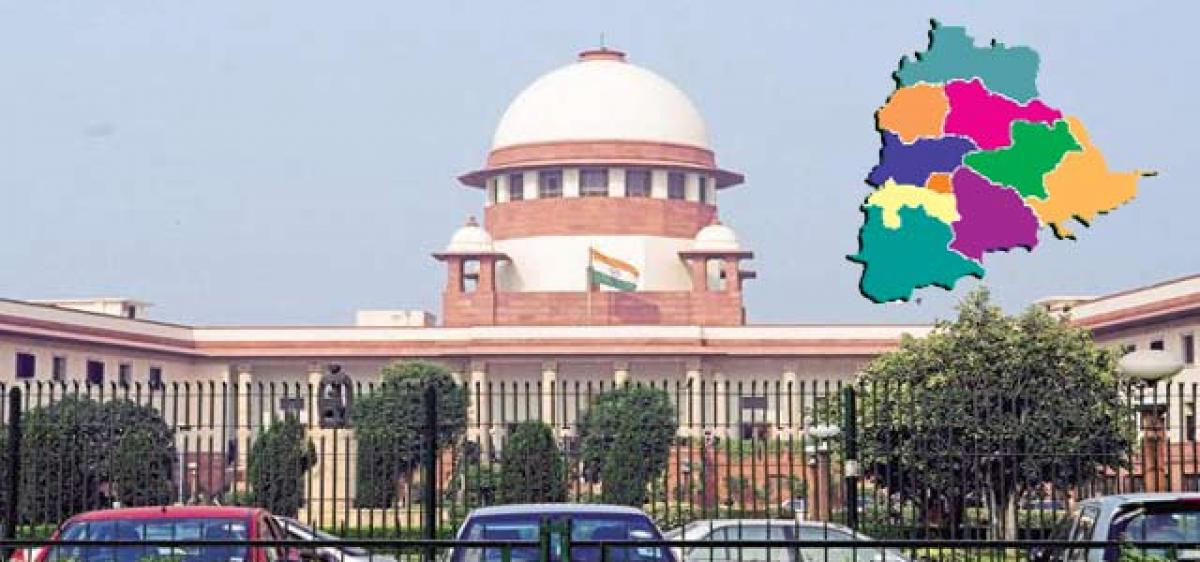Live
- GMR Airports Unveils AI-Powered Digital Twin Platform to Transform Airport Operations
- India poised to become leading maritime player: PM Modi
- Top Causes of Kidney Stones and How to Recognize Silent Symptoms
- India’s renewable energy capacity logs 14.2 pc growth at 213.7 GW
- Winter Session of Odisha Assembly adjourned sine die
- Biden calls Trump's tariff approach 'major mistake'
- After Drama Over Eknath Shinde’s Chief Minister Race, Maharashtra Cabinet Formation Faces New Tensions
- Egyptian FM, Blinken discuss recent developments in Syria
- Iran's supreme leader says Syria's developments result of US-Israeli 'plot'
- Elon Musk to Purchase $100 Million Luxury Mansion Next to Donald Trump's Mar-a-Lago, Report Reveals
Just In

A Supreme Court bench consisting of Justice Madan B Lokur and Justice Prafulla C Panth here on Monday dismissed the Special Leave Petition filed by the Telangana government seeking its intervention in the Krishna Waters Dispute.
New Delhi: A Supreme Court bench consisting of Justice Madan B Lokur and Justice Prafulla C Panth here on Monday dismissed the Special Leave Petition filed by the Telangana government seeking its intervention in the Krishna Waters Dispute.
The petition contended that Telangana was at the receiving end due to the verdict of the Brijesh Kumar Tribunal which ruled that the Krishna River Waters Dispute would be treated as an inter-Telugu states dispute but not as an inter-state dispute among the two Telugu states and Maharashtra and Karnataka.
Telangana counsel Vaidyanathan informed the court that the Centre introduced Section 89 in the AP Reorganisation Act only to review the entire allocation and not between the two Telugu states alone, for which Section 84 was sufficient to deal with
Senior counsel Vaidyanathan arguing on behalf of the Telangana government contended that Telangana would be at loss if the allocation of water is confined to the two states.
The state could not protect its interest in KWDT-1 or KWDT-II because it was part of the composite State. Its larger interests had been neglected.
He told the Bench that the Centre introduced Section 89 in the AP Reorganization Act, 2014 only to review the entire allocation and not between the two Telugu states alone, for which Section 84 was sufficient to deal with.
Justice Lokur commented at this juncture: "Suppose tomorrow if Telangana gets divided into Telangana A, Telangana B and Telangana C... What does one do then? Re-allocate waters to all the states from the beginning? We cannot revisit the issue always?"
Vaidyanathan contended that the Act was a key development as Section 89 declared that if project wise allocation had not been done under the River Waters Disputes' Act of 1956, then a fresh allocation should be taken up.
Justice Lokur commented at this juncture: “Suppose tomorrow if Telangana gets divided into Telangana A, Telangana B and Telangana C... What does one do then? Re-allocate waters to all the states from the beginning? We cannot revisit the issue always”
In addition, the Tribunal should have decided on the operation protocol for the distribution of waters during the lean flow period.
Yet, the Tribunal had not decided on the same and Maharashtra and Karnataka had no water protocol at all. Hence applying Section 89 to just two states would deny Telangana its rightful share of waters.
There was no need to introduce Section 89 if it were to be decided as a dispute between AP and Telangana alone and section 84 would have been sufficient for the same, he said.
Moreover, the Telangana government had approached the Centre as per the Act to resolve the dispute as soon as the state got divided.
The Centre which was to intervene in the issue within a year did not do so forcing the government to move the SC. The case was pending with another Bench. "The Centre turned a deaf ear. The Tribunal ignored our plea. And if you too say not where to go for justice?", he urged.
Senior counsel for Karnataka Nariman argued against the same declaring that the Reorganization Act applied only to the two Telugu States. Maharashtra's Counsel also did the same.
AP counsel Prabhakar Rao was present during the hearing but did not press his government's arguments as no notices were served on his client.
The AP government has all along been not objecting to the plea of Telangana in the Tribunal on reallocation of waters among the four states.
It was opined by irrigation experts that the case of the Telugu states would be strengthened if both the governments worked together in this regard. As the case itself was at the preliminary stage no notices were issued by the court.
However, as their interests were "being affected" the counsels of the upper riparian states joined the issue on Monday.
Finally, the SC dismissed the petition but assured the petitioner that this dismissal would not have a bearing on the pending cases in this regard.
Meanwhile, Karnataka’s Water Resources Minister M B Patil welcomed the Supreme Court’s decision rejecting Telangana demand seeking redistribution of Krishna waters among all the four riparian state.
The Krishna tribunal had already adjudicated by the Krishna Water Dispute Tribunal-II among the four riparian states, he said.

© 2024 Hyderabad Media House Limited/The Hans India. All rights reserved. Powered by hocalwire.com







